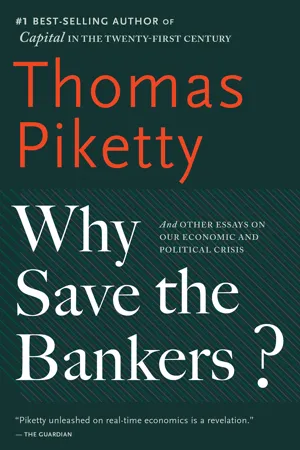
Why Save the Bankers?
And Other Essays on Our Economic and Political Crisis
- 240 pages
- English
- ePUB (mobile friendly)
- Available on iOS & Android
About This Book
Reflections on politics, the economy, and the modern world by the #1 New York Times –bestselling author of Capital in the Twenty-First Century. Thomas Piketty's work has proved that unfettered markets lead to increasing inequality, and that without meaningful regulation, capitalist economies will concentrate wealth in an ever smaller number of hands, threatening democracy. For years, his newspaper columns have pierced the surface of current events to reveal the economic forces underneath. Why Save the Bankers? collects these columns from the period between the September 2008 collapse of Lehman Brothers and the November 2015 terrorist attacks in Paris. In crystalline prose, Piketty examines a wide range of topics, and along the way he decodes the European Union's economic troubles, weighs in on oligarchy in the United States, wonders whether debts actually need to be paid back, and discovers surprising lessons about inequality by examining the career of Steve Jobs. Coursing with insight and flashes of wit, these brief essays offer a view of recent history through the eyes of one of the most influential economic thinkers of our time. "Easy to follow for readers without much knowledge of economics, especially when [Piketty] picks apart topics that defy classical economic logic; in this he resembles Paul Krugman, who similarly writes clearly on complex topics...Helps make sense of recent financial history." —Kirkus Reviews "Anyone with an interest in politics, monetary policy, or international diplomacy will get a kick out of Piketty's clear discussion." — Shelf Awareness "If you have been influenced by Piketty's landmark work on inequality, make sure to read this next." —Naomi Klein, author of The Shock Doctrine and This Changes Everything
Frequently asked questions
Information
Index
A
B
C
Table of contents
- Title Page
- Contents
- Copyright
- Translator’s Note
- Preface
- WHY SAVE THE BANKERS? 2008–10
- Why Save the Bankers?
- A Trillion Dollars
- Obama and FDR: A Misleading Analogy
- Profits, Wages, and Inequality
- The Irish Disaster
- Central Banks at Work
- Forgotten Inequalities
- Mysteries of the Carbon Tax
- Lessons for the Tax System from the Bettencourt Affair
- Enough of GDP, Let’s Go Back to National Income
- Down with Idiotic Taxes!
- Who Will Be the Winners of the Crisis?
- With or Without a Platform?
- Record Bank Profits: A Matter of Politics
- NO, THE GREEKS AREN’T LAZY 2010–12
- No, the Greeks Aren’t Lazy
- Europe Against the Markets
- Rethinking Central Banks
- Does Liliane Bettencourt Pay Taxes?
- Toward a Calm Debate on the Wealth Tax
- Should We Fear the Fed?
- The Scandal of the Irish Bank Bailout
- Japan: Private Wealth, Public Debts
- Greece: For a European Bank Tax
- Poor as Jobs
- Rethinking the European Project—and Fast
- Protectionism: A Useful Weapon . . . for Lack of Anything Better
- François Hollande, a New Roosevelt for Europe?
- Federalism: The Only Solution
- The What and Why of Federalism
- ACTION, FAST! 2012–15
- Action, Fast!
- Merkhollande and the Eurozone: Shortsighted Selfishness
- The Italian Elections: Europe’s Responsibility
- For a European Wealth Tax
- Slavery: Reparations Through Transparency
- A New Europe to Overcome the Crisis
- Can Growth Save Us?
- IMF: Still a Ways to Go!
- Libé: What Does It Mean to Be Free?
- On Oligarchy in America
- To the Polls, Citizens!
- The Exorbitant Cost of Being a Small Country
- Capital in Hong Kong?
- Capital According to Carlos Fuentes
- 2015: What Shocks Can Get Europe Moving?
- Spreading the Democratic Revolution to the Rest of Europe
- The Double Hardship of the Working Class
- Must Debts Always Be Paid Back?
- A Crackdown Alone Will Solve Nothing
- Index
- About the Author
- Connect with HMH
- Footnotes